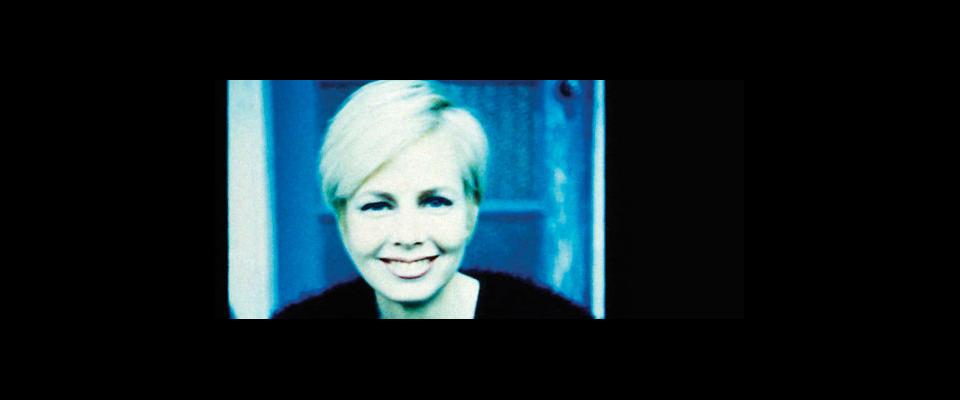Joan Jeanrenaud has forged a second career as a composer.
As Joan Jeanrenaud carefully wends her way down the ramp leading from Mills College’s recently restored music building, she wields the cane in her right hand with casual precision. Though multiple sclerosis has mostly curtailed the cellist’s globe trotting ways, Jeanrenaud’s sonic explorations have multiplied exponentially even as she’s fought to retain her mobility. She has blossomed since leaving the bosom of Kronos Quartet, the era’s most influential and celebrated new music string ensemble, examining electronics and delving into improvisation while performing solo recitals and composing intricate original works.
“I’ve been very lucky, my arms haven’t been affected at all,” says Jeanrenaud, 54, as a breeze toussles her hair. “When I started to get into electronics, I always put my foot pedals on the right side, but my right leg is the one that’s more compromised, so now I use my left side for the foot pedals. You figure that kind of stuff is always good for you somehow. You’re making your mind work in a way it normally doesn’t.”
Since the beginning of her career, Jeanrenaud has immersed herself in mind-expanding music. As a member of San Francisco’s Kronos Quartet from 1978 to 1999, she was at the center of the new music universe, premiering pieces by the 20th century’s most adventurous and influential composers. It was an incredible ride, but in the ensuing decade she’s established her own creative trajectory, becoming a sought-after composer in her own right.
“I never really thought I would compose, but I’m really enjoying it,” Jeanrenaud says. “I have to work hard at it. It’s not something that I’ve done for 40 years, like cello playing. I feel like … I’ve pushed myself to learn different things.”
Building on the intricate skein of relationships forged via Kronos, Jeanrenaud has become a go-to collaborator for Bay Area modern dance companies, with recent commissions from Joe Goode Performance Group, the AXIS Dance Company, and the startling butoh-inspired inkBoat. The Del Sol String Quartet, a young ensemble toiling fruitfully in new music territories, recently commissioned Jeanrenaud to write her first string quartet. And her Strange Toys CD from Talking House, featuring 14 enticingly beautiful compositions, earned her a 2008 Grammy nomination for Best Instrumental Soloist.
No one has played a more important role in Jeanrenaud’s post-Kronos evolution than Larry Ochs, a guiding spirit behind the Bay Area’s other venerable new music foursome, Rova Saxophone Quartet. They first met in the mid 1980s through a Kronos/Rova collaboration, and Ochs determined to keep an eye open for future projects with the cellist. Kronos’s rigorous touring schedule had made that impossible, so when Ochs heard that she was leaving the group he quickly approached her about participating in Rova’s 1999 Music On the Mountain, an outdoor event on Mt. Tamalpais. That marked the first time she presented her own work.
Ochs sensed that Jeanrenaud possessed a gift for improvisation, a skill rarely called upon in Kronos. When he started conceiving music for a trio of saxophone, cello, and koto (a traditional Japanese string instrument), he recruited Jeanrenaud and Miya Masaoka for an ensemble that ended up touring internationally and recording an acclaimed album, Fly Fly Fly, on Intakt.
“Joan is a great cellist,” Ochs says. “She’s got one of the most beautiful sounds there is, and she’s just a great improviser. She’s very orchestrally inclined. She’s back there thinking, What can I do to fill out this group sound? As opposed to many other improvisers who are thinking, How can I inject my thing into the group?”
While Jeanrenaud decided to forgo most travel as she became increasingly unsteady on her feet, her creative purview expanded as she delved into the rich network of Bay Area collaborators, including fellow Mills faculty guitarist Fred Frith and percussionist William Winant. A strict regime of Pilates and treatment by a Tibetan doctor has arrested the MS symptoms.
“It’s one of those things, you just get used to it,” she says. “I feel very fortunate in the decisions I’ve made regarding how to deal with it. My life has gotten more regimented, but I enjoy it. I really like having to walk my dog twice a day, and watching my diet. I’m still not able to run or do a lot of things that I used to be able to do. I can never really be in a hurry, but that’s not such a bad thing. It turns out that composing has been a really good left turn.”




















